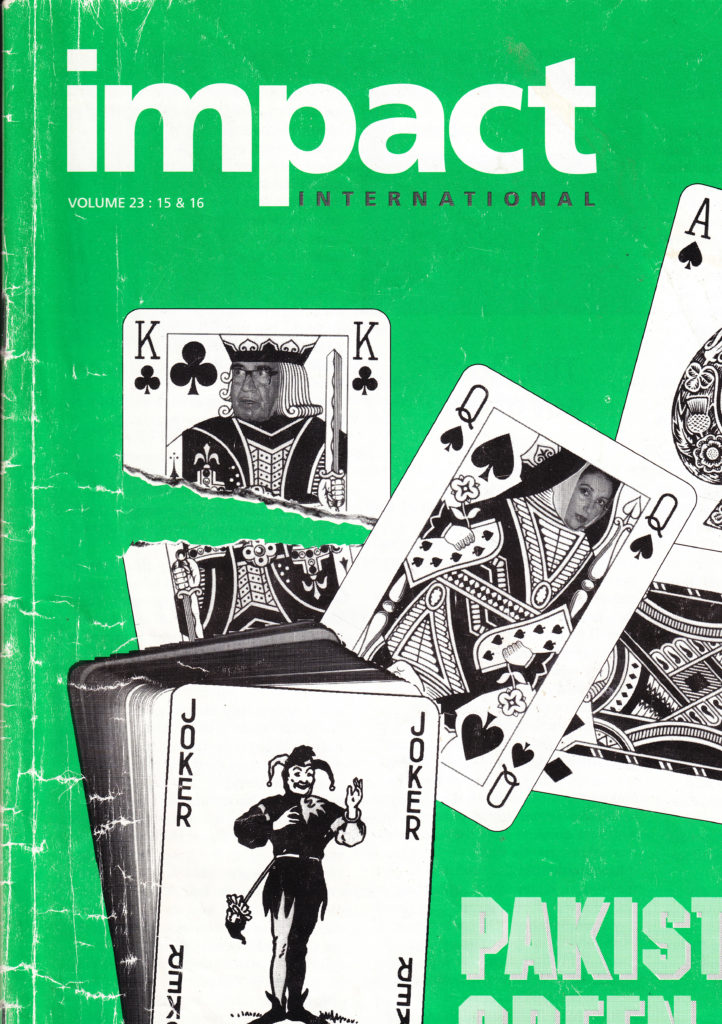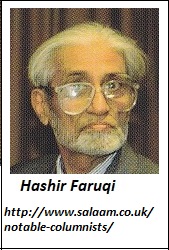
Impact International was a world-recognised, independent Muslim current affairs publication launched in London in May 1971 as “a newspaper which seeks to interpret the ethos of the Muslim world; [provide] balanced reporting and analysis on education, society, economics and politics; book reviews, briefings and other special features”. It lived up to this ambition for over 35 years.
Obituary notices click here
The journal’s founder and chief editor, Hashir Faruqi was born on 4th January 1930 in UP. During his student years he was an activist in the Pakistan movement and served as secretary of the Muslim Students Union and its Urdu literary society at Kanpur Agriculture College (later University). He trained as an entomologist and settled in London in the mid-1960s. He was an important contributor to the weekly Saturday meetings of the London Islamic Circle at the Islamic Cultural Centre, Regents Park, and also wrote under the pen name ‘Scribe’ a column in The Muslim – the monthly magazine of the Federation of Students Islamic Societies in the UK & Eire (FOSIS). This column was a combination of political satire and analysis and was a first in English-language Muslim journalism. He had been thinking of establishing the journal Impact since the mid-1960s. and it began life at 33 Stroud Green Road, Finsbury Park, with the help of AbdulWahid Hamid and his elder brother AbdulAhad..

In 2003 he was among the welcoming committee that organised HRH The Prince of Wales’s visit to the Islamic Foundation, Markfield, and presented a token of appreciation to the royal visitor on behalf of its trustees. In 2013, Hashir Faruqi was recipient of the Editor’s Lifetime Achievement award at the Muslim News Award ceremony. On the occasion, Ahmed Versi, editor of The Muslim News, observed
For me, he was an inspiration to establish the Muslim News, and was a true pioneer for his unflinching journalism. To others, he was an innovator in the British Muslim community, being an intellectual lynch pin for many of our struggles as a burgeoning community. And for his readers, he is our connection from the world we inhabit to now to a Muslim world that began its uncertain journey in the midst of decolonization, war and new modern identities . . .Impact International was a world-recognised, independent Muslim current affairs publication launched in London on 15th May 1970 as “a newspaper which seeks to interpret the ethos of the Muslim world; [provide] balanced reporting and analysis on education, society, economics and politics; book reviews, briefings and other special features”. It lived up to this ambition for over 35 years – thus far, the longest-running British Muslim publication.
In its hay day, it was distributed in 85 countries, with a readership of over 100,000 and a small international subscription base of 20,000. Its analysis was sharp, editorials forthright, and its agenda was to uphold the idea of a Muslim ummah, a pan-Islamic space with a common agenda. The breadth of the magazine was impressive as it covered developments from all four corners of the world.
As editor of this magazine, Hashir Faruqi became not only an observer of current affairs, but very much a participant and actor in unfolding events. For example, Hashir Faruqi, while interviewing an embassy official, was a hostage during the drama of the Iran Embassy siege in 1980. His journalism took him around the world, and a following amongst emerging leaders in the Muslim world. His travels allowed him to obtain unique access to forums of world Muslim leaders.
His reporting and editorials were principled: giving credit when it was due, and criticizing when the situation demanded it.
Perhaps one of his greatest contributions came when the British Muslim community formed an identity of its own during the crisis around the publication of the Satanic Verses. Under his editorship, Impact International highlighted and engaged liberal opinion on the hurt Muslims had felt with this book. The editorials and reporting the magazine made of the book went viral and spurred on the British Muslim community to action.
For the first time, Hashir Faruqi had managed to help mobilise Britain’s diverse Muslim communities: Shias and Sunnis, Salafis and Sufis, all in common cause pleading with fellow Britons that British Muslims should be afforded the same dignity as any other faith group.
His lobbying was dignified and consistent. While he battled with the liberal establishment against the book, he did not join in the violent calls to kill or harm the book’s author.
As a result, Hashir Faruqi was part of a small but unique group of people – quiet, unassuming, but superbly clever – all coming together to be the intellectual lynchpin of an assertive and confident British Islam. Hashir Faruqi became an advisor to the UK Action Committee on Islamic Affairs – an organization that helped mobilise the Muslim community. He also joined the diverse range of leaders and intellectuals to help form the Muslim Council of Britain. He subsequently became an advisor to successive Secretary-generals.
Hashir Faruqi was a tireless, and unassuming servant of the community. Often sacrificing his family life for the greater good. He has used his skills as a journalist, and his ability to bring communities together to help grassroots causes. As a result, he has been a trustee of Muslim Aid, the Muslim Educational Trust, the Islamic Foundation and the Al-Madinah Trust. He has also assisted a range of other charitable activities too numerous to mention here.
I hope, in presenting this award, we state for the record the vast contributions made by Hashir Faruqi. The fact that we had to persuade and cajole Hashir Faruqi to accept this award is a testament to his quality to remain unassuming and humble. And yet, his reputation has long been established in his reporting and dealing with the rich diversity of our Muslim ummah, here in the UK and around the world.
Salaam is grateful for his permission to reproduce here a selection from Impact International.
